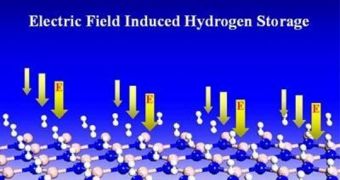One of the main reasons why hydrogen-powered vehicles are not the norm in our world today is the fact that batteries and fuel cells are not yet efficient enough at delivering their charge. In addition, reloading them can be a very complicated and time-consuming process, and this is why physicists have been working on ways of improving the thermodynamics and reversibility of hydrogen-storing materials. There is also an ongoing effort to make them less complex, and therefore cheaper, and a team of scientists from the US and China may already be on to something, ScienceDaily informs.
The team developed a theoretical model that could lead to the creation of simpler, more efficient hydrogen-storage materials in the near future. The scientists argue that using an electric field on these materials could significantly improve the rate at which they store and release the chemicals. The main trouble with hydrogen fuels is getting the substances holding them to release it with fast kinetics under ambient temperature and pressure. At this point, these materials require a number of special conditions that cannot be satisfied within a personal vehicle, and need the controlled confines of a lab to work.
“Although tremendous efforts have been devoted to experimental and theoretical research in the past years, the biggest challenge is that all the existing methods do not meet the Department of Energy targets for hydrogen storage materials. The breakthrough can only be achieved by exploring new mechanisms and new principles for materials design,” the leader of the study, Virginia Commonwealth University (VCU) Associate Professor Qiang Sun, PhD, says. Scientists from the Peking University, in Beijing, and the Chinese Academy of Science, in Shanghai, have also been involved in the investigation.
“We have made such an attempt, and we have proposed a new principle for the design of hydrogen storage materials which involves materials with low-coordinated, non-metal anions that are highly polarizable in an applied electric field,” Sun adds. “Using an external electric field as another variable in our search for such a material will bring a hydrogen economy closer to reality. This is a paradigm shift in the approach to store hydrogen. Thus far, the efforts have been on how to modify the composition of the storage material. Here we show that an applied electric field can do the same thing as doped metal ions,” VCU Department of Physics Distinguished Professor Puru Jena, Ph.D, concludes.

 14 DAY TRIAL //
14 DAY TRIAL //